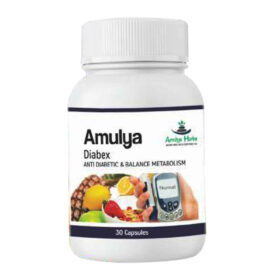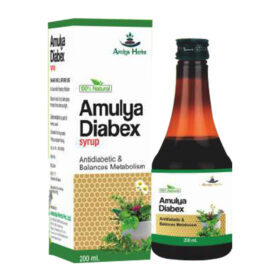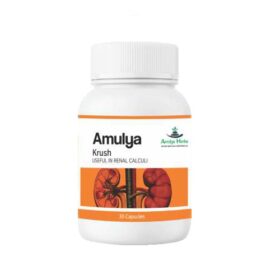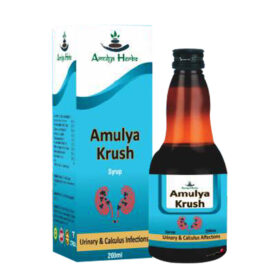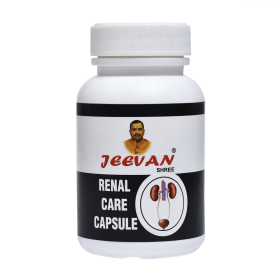
Shop
AMULYA KRUSH FOR RENAL CALCULI / INFECTIONS
₹365.00
Amulya Krush Capsules are very useful in kidney, burning micturition, dysuria. Regular use of it crushes the calculi into very small pieces & expels from the body through urine. It is also helpful in urinary tract infections. Intake of water should be increased during use of this medicine.
AMULYA KRUSH SYRUP Calculus & Urinary Infections
₹260.00
Amulya Krush are very useful in kidney Calculi, burning micturition and dysuria. Regular use of it, crushes the calculi into very small pieces & expels from the body through urine. It is also helpful in urinary tract infections. Intake of water should be increased during use of medicine.
-50%
Jeevan Shree Renal Care Ayurvedic Medicine
₹750.00 ₹1,499.00
Jeevan Shree RENAL Care Capsules is an Ayurvedic tablet for All Renal Problems. it is natural and Ayurvedic product which helps in Kidney stones, helps in improving kidney function and also helps in urinary tract infection, Indications – Associated symptoms with kidney stones, burning sensation while urination, non-specific urinary tract infection, urinary calculus
Dosage: Take 1 Renal Ayurvedic capsule twice a day after meals with a glass of water. Or as prescribed by the physician.
Anyone who has experienced the pain of a kidney stone and has survived through it for a long time knows the dreadful pain of it. This condition affects the significant amount of population around the world. There is probability of 1 out of 5 men in the population to have a kidney stone while in women the probability lies in 1 out of 10 according to the National Kidney Foundation. A kidney stone is hard mass that is formed from crystals in the urine and in most of the people; natural chemicals in the urine help stop form the stone from the urine. The role of kidneys in a human body is to remove waste and filter minerals and salts to maintain a healthy balance of the fluid intake. A steady supply of fluids especially that of water keeps the whole process of flowing intact and healthy. The waste products carried out by the blood to the kidneys; filtered and then converted into urine. It is then sent on its way to the urinary bladder. It is stored there until it is eliminated from the body. There may be certain minerals in the waste tract that can accumulate in the kidneys and form a solid stone. Stones that are very small or are of a pinhead size may even pass through the urine without notice but the larger ones stay behind in the kidneys and obstruct the urinary pathway causing acute pain and bleeding.
In Ayurvedic medical terminology, it is known as VrukkaAshmari where ‘Vrukka’ means ‘kidney’ and ‘Ashmari’ means ‘stone’. According to Ayurvedic science, if a person takes improper diet and has a lifestyle that lead to aggravation of the doshas (Ayurvedic humors) and impairment of the digestive fire causes the formation of toxins (ama) in the body. These toxins travel down the channels that carry urine, where aggravated doshas combine with it, causing its crystallization and leading to the formation of kidney stones. A couple of regular reasons for kidney stones are unreasonable protein admission, calcium in drinking water, family background of kidney stones, high uric levels, heftiness or obesity, exorbitant drinking or smoking, symptom of meds like painkillers, utilization of pitta-aggravating foods, persistent pressure and strain. Patients experiencing diabetes or high blood pressure are at expanded danger of getting kidney stones.


